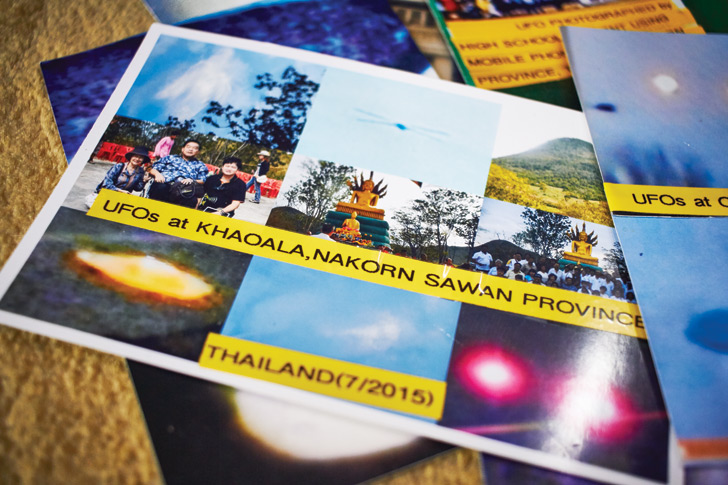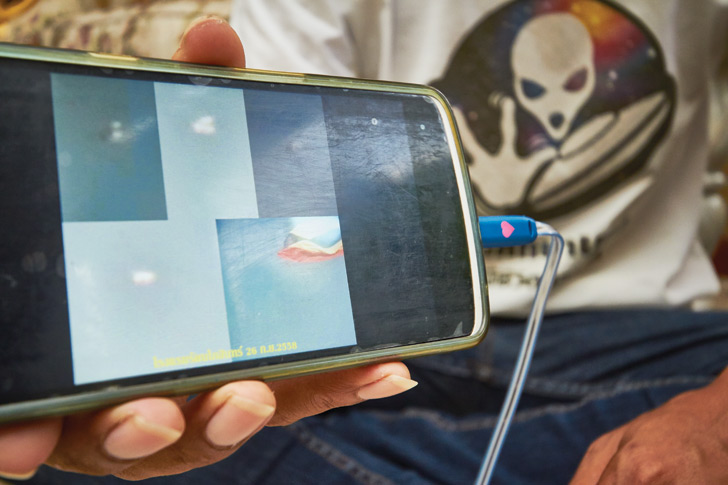“We are not alone, my friend,” says Ek Tha, also known as Ek Madra. He’s not kidding. We’re surrounded by a few dozen Cambodians engaged in a post-work fried-chicken frenzy at a restaurant in Phnom Penh. It’s noisy and children are dashing around, drumsticks in hand. What he actually means is we’re not alone in the universe.
“The Earth has existed for five billion years,” he says, “and what we call extraterrestrials have existed for billions of years too. But we can’t contact them, only they can contact us.”
Tha is short and well-built, with intense eyes that protrude behind thick-rimmed glasses and a passion for his subject that makes him immediately likeable. He enjoyed a successful career as a journalist before becoming deputy director of the Cambodian Council of Ministers’ press department. “I do not have any scientific data to prove it but, for me, aliens totally exist,” he says.
Tha’s interest began early. As a child in rural Takeo province he had little to do at night except stare up at the sky. “I’d ask questions about the universe. But no one could give me the answers,” he remembers. “Why, for example, do we have moons and stars? Why do we have seven days? Why 12 months? Our Khmer ancestors, thousands of years ago, had no connection to the Western world. So how did we come up with the same seven days a week? Twelve months a year? It represents something from elsewhere in the universe.”
Tha, 45, is among the few Cambodians to have seriously pondered the existence of extraterrestrials. And, like so many people, Tha is enrolled full time at the University of Google. “I can stop eating, but I can’t stop searching for UFO information online,” he admits.
Asked what he believes aliens want with our planet, he replies: “There are 82 species. Some have four fingers, some three; some are big, some small. And some are good guys; some are bad guys. The good aliens will help us live sustainably, and the bad aliens will come to kill us. You have to watch out for that.”
According to Ahmad Jamaludin, a Malaysian UFO researcher, the first known sighting of a flying saucer in Southeast Asia was recorded in Bangkok in 1810, reported by a Briton. “Between July and August of 1810, there appeared to be a concentration of UFO and alien sightings around Bangkok. This is called a UFO wave,” Jamaludin says.

During a UFO wave, he explains, there are often widespread reports of lights in the sky and encounters with strange humanoids, and then everything returns to normal. Waves usually last between one and four weeks, and happen every nine to 11 years, he adds.
“So there was a concentration of UFO reports in Indochina in 1948, Papua New Guinea in 1959, Malaysia in 1970, the Philippines in 1979 and then in Malaysia again in 1999. The next expected wave should be around 2019, plus or minus a year,” Jamaludin says.
Jamaludin, who self-published a book titled UFO Reports in Southeast Asia (1800-1996) in 1997, has pieced this theory together through years of research. He believes there were UFO sightings in the region centuries ago that went undocumented, as people didn’t understand the extraterrestrial significance. “In Malaysia, there is folklore that speaks about tiny people only eight centimetres tall. It was only after I started compiling all the UFO cases that I realised they could be referring to aliens,” he says.
Debhanom Muangman is a Harvard University-educated physician, a former dean of public health at Thailand’s Mahidol University and a former advisor to the country’s health minister. The 80-year-old’s CV also includes golf course management, military service, refugee camp work and, he says, advising the Thai King on and off for two decades. Muangman is now wheelchair-bound and suffers from a nasty cough, but his mind buzzes beautifully. Sitting in his palatial Bangkok home, he explains how he cured 33 cases of cancer through prayer and is able to contact aliens, on a regular basis, through meditation.
I had experiences with aliens as a child in Thailand. They used to come and play around in my house in the morning. But I didn’t know they were aliens.
Debhanom Muangman
“The aliens, like this one,” he says, pointing to a blurry photograph, “they speak to me when I meditate. It happened two nights ago at my house in Chiang Mai. One says he is from Mars.”
Muangman says aliens warned him two years ago about the escalating tensions in southern Thailand and also told him in January 2004 there would be a tsunami by the end of the year.

“Once, an alien called me by telephone,” he says. “He was speaking Thai, although in an odd accent… another one told me that drones are actually alien technology given to the US. Then there’s one called Nemo – he’s very smart. He said aliens don’t have sex like humans, and when they want to have a baby they press their hands together; they’re doing cloning.”
Sitting at Muangman’s feet are a handful of members of the Kaokala group, an ensemble of believers who take their name from a hill in Thailand’s Nakhon Sawan province that is said to be a UFO hotspot. Most are young and energetic, passing each other photographs of blurred objects in the night sky. They refer to Muangman as “the doctor” and say he is “the first person to announce the existence of aliens in Thailand”.
Ploy Buranasiri, 25, is a firm believer. “Originally, I didn’t believe in UFOs. But one day, I had a disaster in my brain. I saw a vision of disaster in the future, that’s why I joined the group,” she says, before adding that she can heal people. She closes her eyes, instructs me to do the same and grasps my hands. When I open my eyes a minute later, she’s frowning. “Did you feel anything?” she asks. Nothing. “I sense you are not well. Something is wrong with your heart,” she says.
“Oh, that’s not good,” I say.
“No,” she replies.
In contrast to Tha’s fears that aliens want to take over the world, the Kaokala group believe the aliens that have contacted them (who they say come from both Pluto and Lokukatapakadikong, a planet in another solar system) are actually intergalactic altruists.
“Real extraterrestrials are different from those in Hollywood films, where they always want to conquer Earth. Aliens actually want to help us,” says Wassana Chansamnuen, the 43-year-old daughter of one of the group’s founders. “The message we receive is that there will be a disaster. There will be World War Three and, afterwards, aliens will send their technology to help humans. When the time of crisis happens, humans won’t be able to heal themselves, so we’ll rely on aliens. It’s science. Like quantum physics.”
Asked when this doomsday scenario is likely to occur, Chansamnuen replies cryptically: “Aliens say humans will know before it happens.”
Muangman interjects: “It will be between China and the US within the next five years.”
“There are two questions,” says Michael Shermer. “Are extraterrestrials out there? And have extraterrestrials come here? My answers are: Probably yes, and definitely no.”
Shermer, founder of the Skeptics Society and editor in chief of its magazine, Skeptic, says that people who believe they have seen UFOs actually witnessed atmospheric phenomena – optical illusions produced when the light from the sun or moon comes into contact with dust or water in the atmosphere. Or they have simply mistaken aeroplanes, weather balloons or stars for alien crafts.
Remember what the U in UFO stands for: unidentified. Unidentified does not mean extraterrestrial. It just means: ‘I don’t know,’ and nothing more. It’s OK not to know
Michael Shermer
Yet, according to a 2012 National Geographic poll, one in ten Americans believes they have seen UFOs or encountered aliens. Optical illusions or distant aeroplanes couldn’t have confused all 30 million of them. Shermer says such beliefs can also be explained by the way our brains naturally operate.
In recent decades, dozens of psychologists have devoted countless hours to assessing the thought patterns of people who insist that they have seen UFOs or been abducted by aliens. One suggestion is that alien enthusiasts are prone to confirmation bias. This is when someone has a pre-existing belief – say, that aliens have visited Earth – and then searches for information to validate their conviction while ignoring contrary evidence.
“UFO [believers] are perfectly normal, albeit many have very vivid imaginations and are fantasy-prone,” Shermer says. “The cause [of their beliefs] is that the brain abhors a vacuum of explanation and, short of a good explanation, most people will glom [attach] onto any explanation on offer, which in popular culture is aliens.”

Southeast Asia’s UFO enthusiasts are well aware that by going against mainstream thought they open themselves up to ridicule from non-believers. Tha estimates that only 15% of his fellow Cambodians believe in alien life. “The rest say that I’m stupid,” he adds. “But 500 years ago, when people said our earth was round, they got in trouble. They were thrown in jail. People said it was a stupid idea.”
However, the region’s believers are in good company. Many scientists, astronomers and cosmologists accept that the existence of alien life outside of our solar system is a statistical probability, while others believe aliens might one day make contact. This group includes Stephen Hawking, the world’s most famous scientist, who launched Breakthrough Listen last July, a $100m project that aims to survey 100 galaxies for intelligent life using two of the world’s most powerful telescopes.
In fact, Hawking is quite fearful of aliens. He believes they will one day “conquer and colonise” Earth and that “the survival of the human race will depend on its ability to find new homes elsewhere in the universe”, reported the UK’s Daily Telegraph newspaper.
Professor John E. Mack was a psychiatrist and Pulitzer Prize-winning biographer who began researching alien abduction stories in the late 1980s. At first, he dismissed them as the product of delusion but, after years of research, concluded that the behaviour of abductees suggested that they were not fabrications of the brain. “The only thing as a psychiatrist that I knew that behaved like [an abduction experience] was a real experience,” he wrote in his bestselling book, Abduction. Mack became a minor celebrity and was almost fired from his post at Harvard University.
“I first met Mack in 1964, I think, when I went to listen to one of his lectures. He became a good friend. I learned a lot from him. And when I discovered cave paintings of aliens in Thailand I contacted him. He said he wanted to come and see. But then he was run over [and killed] by a car one week later,” Muangman says. “Maybe he was getting too close to the truth.”


